|
Eurobarometer Oktober 2003:
Die Rolle der EU im Nahost Friedensprozess
Im Auftrag der EU-Kommission wurden im Oktober
2003 über 7.500 Europäer zur Situation im Irak, zum Terrorismus und
den Auswirkungen auf den Weltfrieden befragt.
Der erste Teil der EU-Umfrage vom Oktober 2003
befasst sich mit dem Irak-Krieg.
| A. AFTERMATH OF IRAQI WAR
1. Was military intervention in Iraq justified?
Die große Mehrzahl der Bürger der Europäischen
Union hält die Invasion des Irak im vergangenen März für
unberechtigt. Die Studie zeigte, dass 68 Prozent der Europäer
dieser Meinung sind, gegenüber nur 29 Prozent, die den Krieg für
richtig hielten. Insbesondere in Griechenland, Frankreich und
Österreich ist die Öffentlichkeit gegen den Krieg. Dort teilen
96 Prozent, 81 Prozent und 86 Prozent der Bürger diese Meinung.
In Deutschland fiel das Ergebnis ähnlich deutlich aus. Hier
halten 72 Prozent der Befragten den Krieg für unrechtmäßig.
2. Reconstruction in Iraq
2.1 Who should manage the rebuilding of Iraq?
Die Studie zeigt, dass die Mehrheit der
EU-Bürger den Wiederaufbau Iraks für eine internationale
Angelegenheit halten. Demnach sind 58 Prozent der Ansicht, dass
die UNO die Führungsrolle übernehmen soll. Die irakische
Übergangsregierung sehen 44 Prozent als beste Instanz für diese
Aufgabe.
2.2 Who should finance the rebuilding of Iraq?
Lediglich 18 Prozent der Befragten sehen die
USA als geeignet, den Wiederaufbau des Iraks zu leiten.
Allerdings ist eine Mehrheit der Meinung, dass die Vereinigten
Staaten für die Finanzierung des Wiederaufbaus aufkommen sollen.
Insbesondere die deutschen Befragten, 84 Prozent, wollen die USA
hierfür zur Kasse bitten.
2.3 Who should guarantee security during the
rebuilding period?
Auf die Frage, wer für die Sicherheitslage im
Irak zuständig sein soll, fiel die Antwort größtenteils ähnlich
aus. Nur sechs Prozent der Europäer denken, dass hierfür die USA
verantwortlich sein soll, wogegen 43 Prozent für die UNO sind.
2.4 Participation of “our” country
Die meisten EU-Bürger sind immerhin dafür,
dass sich die EU und einzelne Mitgliedsstaaten durch finanzielle
und humanitäre Hilfe am Wiederaufbau des Irak beteiligen.
3. Transition to a sovereign Iraqi Government
|
Im zweiten Teil der Befragung geht es um die
internationalen Beziehungen der EU und um ihre Rolle im
Nahost-Friedensprozess.
Den vollen Bericht einschließlich aller Ergebnisse
des Eurobarometers finden Sie
auf den Seiten der EU (als pdf).
1.2
Role of the EU in the Middle East peace process
The EU plays a pivotal role as a major political
and economic actor in the Israeli-Arab peace process. Participation
in political talks with all parties is aimed at promoting the EU’s
position in negotiations for the final settlement of the
Israeli-Arab conflict.
In the next section, we will look at what citizens
think of the European Union’s participation in the Middle East peace
process.
Source Questionnaire: question 7a
- Strong support from citizens for EU’s
participation in the Middle East peace process -
* Overall picture:
81% of citizens believe that the European Union should play an
effective role in resolving the peace process, of which 36% “totally
agree”. Only 16% of citizens disagree with the EU playing an
effective role here.

Breakdown by country:
In each Member State, the vast majority of citizens support the
European Union in its effort to play an effective role in resolving
the Middle East conflict. The overall levels of support (i.e. those
responding “totally agree” or “rather agree”) are highest in Greece
(90%) and Italy (89%). The overall levels of support, while still
high in Finland and Sweden, rank lowest in the EU, at 66% and 68%
respectively.
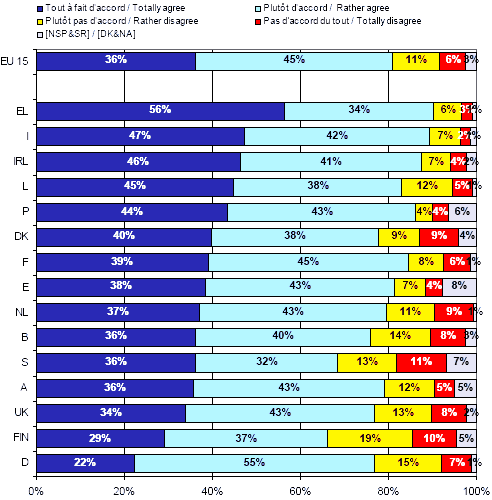
Breakdown by socio-demographic and other category:
No socio-demographic discrepancies can be identified on this issue.
All subcategories agree almost unanimously with the fact that the EU
should reinforce its role in resolving the peace process in the
Middle East.
1.3
Exchanges between European and Arabic countries
Efforts are being made at the European Union level
to encourage exchanges between European and Arabic countries. The
Euro-Mediterranean Partnership, a wide framework of political,
economic and social relations between the 15 Member States of the
European Union and 12 Partners of the Southern Mediterranean
(Algeria, Cyprus, Egypt, Israel, Jordan, Lebanon, Malta, Morocco,
Palestinian Authority, Syria, Tunisia, Turkey), launched in
Barcelona in 1995 is an example of this.
From 1995 to 2002, over € 5.7 billion has been
committed for co-operation programmes, projects and other supporting
activities. The regional programmes aim at promoting closer
integration between the EU and its Mediterranean Partners. Regional
programmes cover a wide range of issues relating to all three
chapters of the Euro-Mediterranean Partnership, namely the political
and security chapter, the economic and financial chapter, and the
social, cultural and human chapter.
In this section we will look at how citizens
perceive political and cultural exchanges between European and
Arabic countries.
Source Questionnaire: question 7b
- 86% of EU citizens believe in the importance of political and
cultural exchange with Arab
countries -
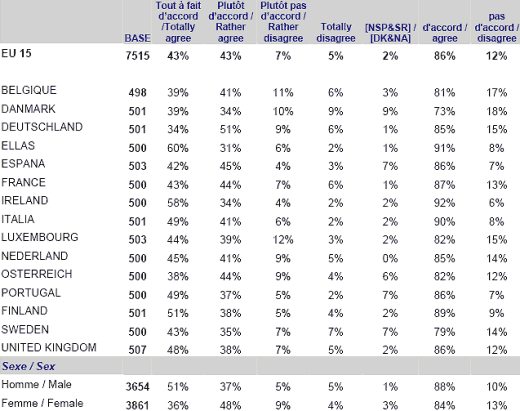
86% of citizens believe that the European Union
should encourage political and cultural relations between Europe and
Arab countries. The strength of agreement is equally split between
those who “totally agree” (43%) and those who “rather agree” (43%).
Breakdown by country:
In thirteen Member States, at least eight in ten respondents agree
that political and cultural exchanges between European and Arabic
countries should be encouraged. At the lower end of the agreement
scale, although still very high are Denmark (73%) and Sweden (79%).
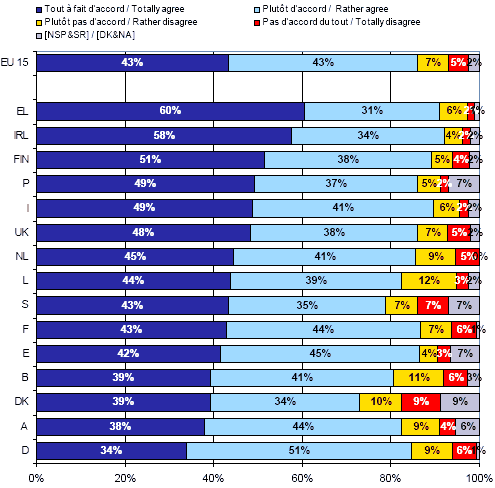
Breakdown by socio-demographic and other category:
The more highly educated respondents (those who have been educated
until at least the age of 21) are highly likely to believe that the
European Union should engage in political and cultural exchange with
Arabic countries, corresponding to an agreement rate of 92%.
Peace in the world
Eurobarometer (Oktober 2003, Kap. 2.1):
Die Bedrohung durch den Terrorismus
In a speech at the United Nations on the “Overview
of the Terrorist Threat to International Peace and Security” 8,
Professor Paul Wilkinson began by stating that “in the events of
11th of September we have crossed a terrible watershed for
terrorism, which has been largely seen as a form of low-intensity
conflict, very often of primary concern to the governments of a
particular country, as a relatively routine problem of security and
law and order”. He went on to say “we are now dealing with sub-State
groups influencing death on such a scale that we cannot describe it
in any other way than by the description of “mass terrorism”. More
people died in one day on 11th of September than died in 35 years of
sub-State terrorism in Western Europe”.
The sheer scale of the terrorist attacks on the
United States of America on 11 September 2001 caused the
international community to focus on the issue of terrorism with
renewed intensity.
In this section, we will analyse how European
Union citizens perceive the threat of terrorism in their country.
Source Questionnaire: question 9
- Marked differences across Member States in the extent to which the
threat of terrorism is felt -
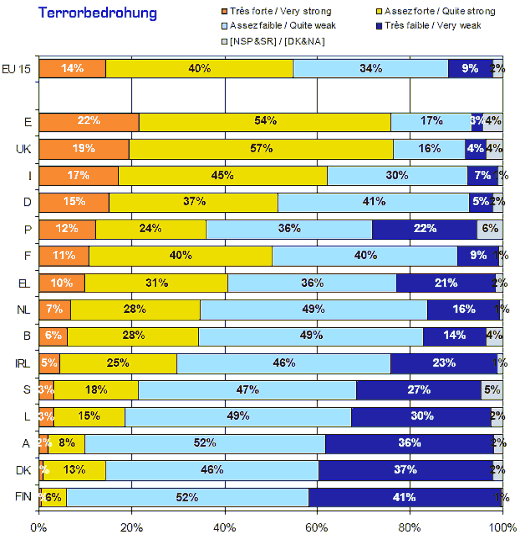
Overall picture:
55% of European Union citizens feel that the threat of terrorism in
their country is strong, a result which demonstrates the
trans-national nature of this phenomenon. A minority of 43% feel
that this threat is weak.
8) 25 October 2001, Symposium on Terrorism and
Disarmament, United Nations, New York
2.2
Wer bedroht den Weltfrieden?
Q10. Pour chacun des pays suivants, dites-moi si,
selon vous, il représente ou non une menace pour la paix dans le
monde?
Q10. For each of the following countries, tell me if in your
opinion, it presents or not a threat to peace in the world?
Frage 10: Bitte geben Sie für jedes der
genannten Länder an, ob es eine Gefahr für den Weltfrieden
darstellt.
In Bezug auf Israel beantworteten diese Frage 69% der Österreicher,
65% der Bundesbürger und 59% der EU-Bürger mit "Ja".
Réponses: oui / Answers: yes
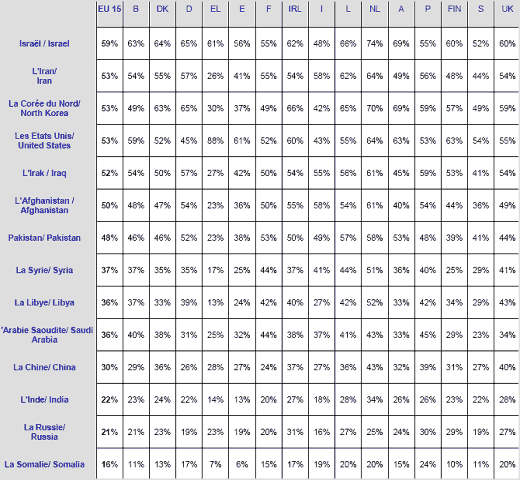
Bedroht Israel den
Weltfrieden?
59% aller Europäer sind also der Meinung, daß
Israel heute das Land ist, das den Weltfrieden am stärksten bedroht.
Ebenso ist, laut dieser Untersuchung des Eurobarometers, die große
Mehrheit der Bevölkerung der EU-Länder davon überzeugt, daß die
Vereinigten Staaten – gemeinsam mit Nordkorea, Iran, Irak und
Afghanistan, am meisten zur weltweiten Instabilität beitragen.
Rabbi Marvin Hier, Leiter des Simon-Wiesenthal-Zentrums, Los
Angeles, zeigte sich schockiert. Dass Israel als noch größere
Bedrohung empfunden werde als der Iran und Nordkorea, widerspreche
jeglicher Logik und sei Ausdruck "rassistischer Fantasien". Sie
zeige, dass der "Antisemitismus in Europa tiefer verwurzelt" sei als
zu jeder anderen Zeit nach dem Zweiten Weltkrieg. (Siehe:
Alarmierende EU-Umfrageergebnisse zurückgehalten).
Breakdown by country
In all Member States (with the exception of Italy)
the majority of citizens believe that Israel presents a threat to
peace in the world with “yes” results as high as 74% in the
Netherlands and 69% in Austria.
Italy is the only country were opinions are
divided with 48% of respondents confirming that they perceive Israel
as a threat to peace in the world and 46% of the opposite opinion.
Ist Israel eine Bedrohung für den Weltfrieden?
Ja / Nein / Keine Meinung
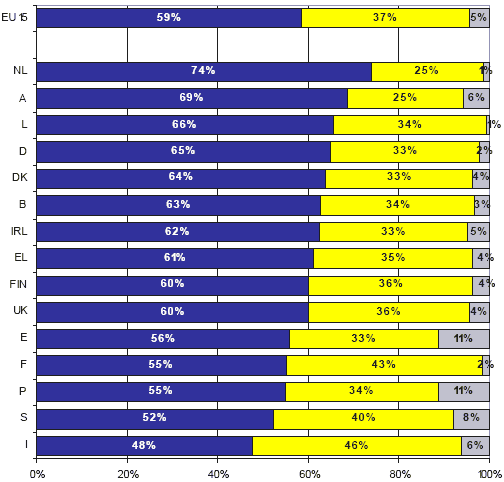
Breakdown by socio-demographic and other
category
The one socio-demographic characteristic that
stands out is education – the more highly educated respondents (66%)
are more likely to perceive Israel as a threat to world peace than
those who ceased their studies at an earlier age (“16-20”: 59% and
“15 and younger”: 50%).
59% sehen in Israel die Friedensbedrohung No.1:
Alarmierende EU-Umfrageergebnisse zurückgehalten
Rabbi Marvin Hier, Leiter des
Simon-Wiesenthal-Zentrums, Los Angeles, zeigte sich schockiert. Dass
Israel als noch größere Bedrohung empfunden werde als der Iran und
Nordkorea, widerspreche jeglicher Logik und sei Ausdruck
"rassistischer Fantasien"...
Den vollen Bericht einschließlich aller Ergebnisse
des Eurobarometers finden Sie
auf den Seiten der EU (als pdf).
Nachrichten der EU-Kommision:
Europa Online
Die zentrale
Europa-Homepage hilft Ihnen mit Verweisen und Links zu allen
europäischen Organen und Politikbereichen weiter. Sie finden hier
auch die direkten Zugänge zu den
Generaldirektionen und Diensten der Europäischen Kommission und
zu den
Tätigkeitsbereichen der Europäischen Union.
hagalil.com
04-11-2003 |